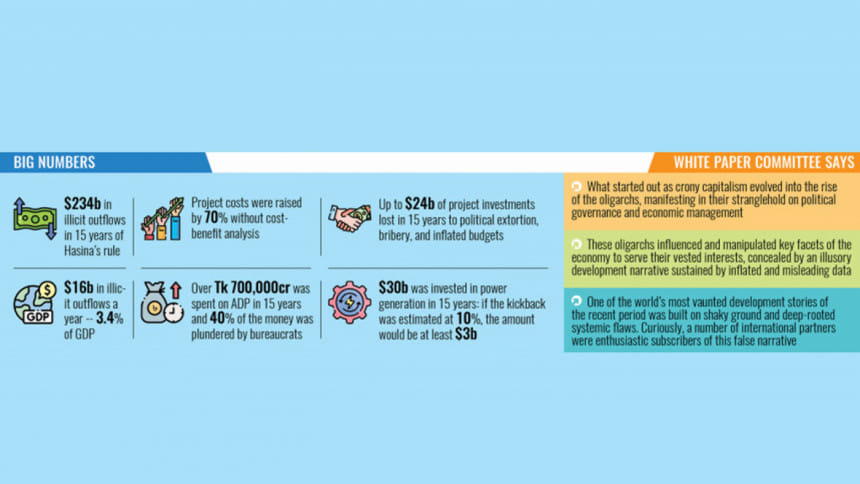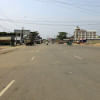Cost of seven mega projects jumped 70% from initial estimate

Seven mega projects taken up by the previous government cost Bangladesh Tk 80,569 crore more than initial estimates due to escalating cost and time overruns, according to the final draft of the white paper on the state of the economy.
Construction of those large infrastructures suffered from poor planning, corruption and inadequate governance, ultimately leading them to require more money and miss deadlines.
The projects are the Padma Multipurpose Bridge Project, Multi-Lane Road Tunnel under the Karnaphuli River, Dhaka Mass Rapid Transit Development Project, Padma Bridge Rail Link Project, Dohazari to Cox's Bazar Railway Track, Payra Deep Sea Port and Matarbari Ultra Super Critical Coal-Fired Power Project.
The total of the initial estimates for the projects stood at Tk 114,547 crore, while the final cost reached Tk 195,116 crore.
In the white paper, a chapter titled "Mega Concerns of Megaprojects" says project pitfalls, such as poor planning and corruption, created a "vicious cycle" that forced the nation to pay over 70 percent more for the infrastructures than initially estimated.
The report calls for stronger project evaluation, improved procurement processes and better oversight to prevent misappropriation. Without reforms, it said, these inefficiencies could undermine Bangladesh's development and economic stability.
Mustafizur Rahman, a distinguished fellow at the Centre for Policy Dialogue and a member of the white paper panel, said the cost escalation occurred as many components were added, inflated land prices were shown and purchases were manipulated.
The project costs rose almost 70 percent in the absence of any cost-benefit analysis, he said.
Rahman and his colleagues examined seven large projects out of 29, with over 10,000 crore taka expenditure outlay for each. The total expenses of the 29 large projects stood at $87 billion, or Tk 780,000 crore.
The panel found a number of common features of the projects, including external borrowing on stringent terms, distinct from those Bangladesh had traditionally received.
Repayment periods for numerous mega projects have either started or are set to start in the near future, entailing a significant rise in the country's debt servicing obligations, the report said.
The report mentions that corruption and irregularities jeopardised the implementation throughout.
Pre-implementation stage
The project preparation and approval phase revealed several weaknesses, including substandard feasibility studies and the absence of a comprehensive work plan during implementation, according to the report.
Projects often proceeded without securing primary land acquisition approval from district administrations, resulting in time and cost escalations.
Additionally, financial ceilings outlined in the government's medium-term budgetary framework were frequently disregarded, baseline data was inadequately collected and exit plans were poorly formulated.
Inaccurate market needs assessments and the influence of "pet projects" driven by vested interests further undermined project viability, it said.
Bureaucratic inefficiencies and delays in obtaining approval from ministries and international funding agencies compounded the challenges, while alternative scenarios were rarely developed.
Implementation plagued by too many tweaks
The implementation phase was plagued by frequent project and cost revisions, non-compliance with schedules and procurement plans, and poor coordination among field-level agencies.
Transparency and accountability in project management were weak, exacerbated by widespread subcontracting that compromised quality. Contractors often requested extensions, leading to significant time and cost overruns.
Fragmentation among implementing agencies further impeded efficient execution.
Project irregularities don't stop even after implementation
In the post-implementation phase, critical gaps included a failure to submit project completion reports to the Implementation Monitoring and Evaluation Division (IMED) within three months, insufficient budget allocation for maintenance and inadequate preservation of infrastructure and equipment, according to the report.
A lack of skilled human resources also necessitated reliance on long-term service agreements with foreign contractors.
Furthermore, the absence of a system for assessing returns on mega projects over time hindered the ability to evaluate outcomes against the goals outlined in Development Project Proposals (DPPs) and Revised DPPs, undermining the long-term sustainability of public investments.
Mega projects with flawed cost-benefit calculations
According to the report, accurate return-on-investment estimates are vital for project justification, yet the calculations for these mega projects often lacked the required rigour.
For instance, the report says that despite a 26.5 percent cost escalation for the Karnaphuli tunnel between the DPP (2015) and RDPP (2022), financial analyses, including the benefit-cost ratio and internal rate of return, remained unchanged.
Cost-benefit analyses for long-term projects were flawed, with costs calculated at constant prices and benefits at nominal prices, disregarding time lags in benefit generation.
Such practices demand thorough review and reform for better accountability.
Higher costs for substandard quality
The report found construction costs in Bangladesh are significantly higher compared to neighbouring countries, yet construction quality remains substandard.
For instance, the per-kilometre cost of a four-lane urban arterial road in Bangladesh is 4.4 times higher than in India and 2.15 times higher than in Pakistan.
Projects like the Dhaka-Sylhet Highway and Dhaka-Mawa-Bhanga Highway illustrated exorbitant costs, attributed to high land acquisition expenses, imported equipment, and challenging floodplain environments.
However, these factors alone fail to justify the discrepancies.
The Dhaka-Chattogram Highway Project underscores systemic issues, including inadequate feasibility studies, flawed designs, substandard materials, inaccurate traffic forecasts, and frequent project director changes, leading to cost overruns and delays.
There was also an uneven playing field for contractors.
Tenders were reportedly designed to favour specific companies, enabling collusive practices. A TIB review of 48 projects found misappropriation of over TK 50,000 crore.
Land acquisition costs, influenced by insider trading, rose significantly, exemplified by Dohazari-Cox's Bazar Rail Track and Karnaphuli Tunnel projects.
'EVALUATE RIGOROUSLY'
To address these issues, the white paper recommends several corrective measures.
One key recommendation is the need for more rigorous evaluations of the financial viability of projects, including cost-benefit analyses and sensitivity tests to assess the impact of cost escalations.
The report also called for reforms to the procurement system to encourage more competitive bidding and reduce the risk of corruption. Strengthening the capacity of the IMED and other monitoring agencies is also essential to ensuring that projects are completed on time, within budget, and with the expected returns.
The report concludes with a call for a comprehensive review of the current approach to mega projects. It stresses the need for greater transparency, improved governance, and stronger accountability mechanisms at every stage of project implementation.

 For all latest news, follow The Daily Star's Google News channel.
For all latest news, follow The Daily Star's Google News channel. 









Comments